Career & Alumni
Graduates Working in Japan
Seeking Employment in Japan
In Japan, recruiting process starts more than a year ahead of graduation and can be an unfamiliar territory for many international students. The University's Bureau of Human Empowerment (BHE) provides information on job hunting in Japan, including this website. The "Alumni Success Stories" can shed light on how our graduates landed on the job at various Japanese companies. We also encourage our students to visit the Bureau located at the Student Plaza Building on campus. The University's career consultants can help you how you can stay informed and ahead of the race.
Bureau of Human Empowerment (BHE) siteJob Hunting in Japan
- Undergraduate and Master's Students
- Doctoral Students
-
Understand Japan's unique job-hunting activity
- Simultaneous recruitment of new graduates
- Joining the company in April
- Potentiality-based recruitment
-
Act early for job hunting
- Job hunting/offering process takes a year
- Recruiting activities begins from the summer on the third grade (junior) for undergraduates
-
Acquire Japanese language skills for job hunting activity
-
Understand Japan's unique job-hunting activity
- New graduate recruitment or mid-career recruitment
- Joining the company generally in April, sometimes joins year-round
- Register PhD x FUTURE.
-
Act early for job hunting
- Decide whether you work in academia or corporate employment
-
Acquire Japanese language skills for job hunting activity
What you can do now ...
- Mingle with Japanese students
- Expand your network
Image of Job Hunting Schedule in Japan
- March Graduation
- September Graduation
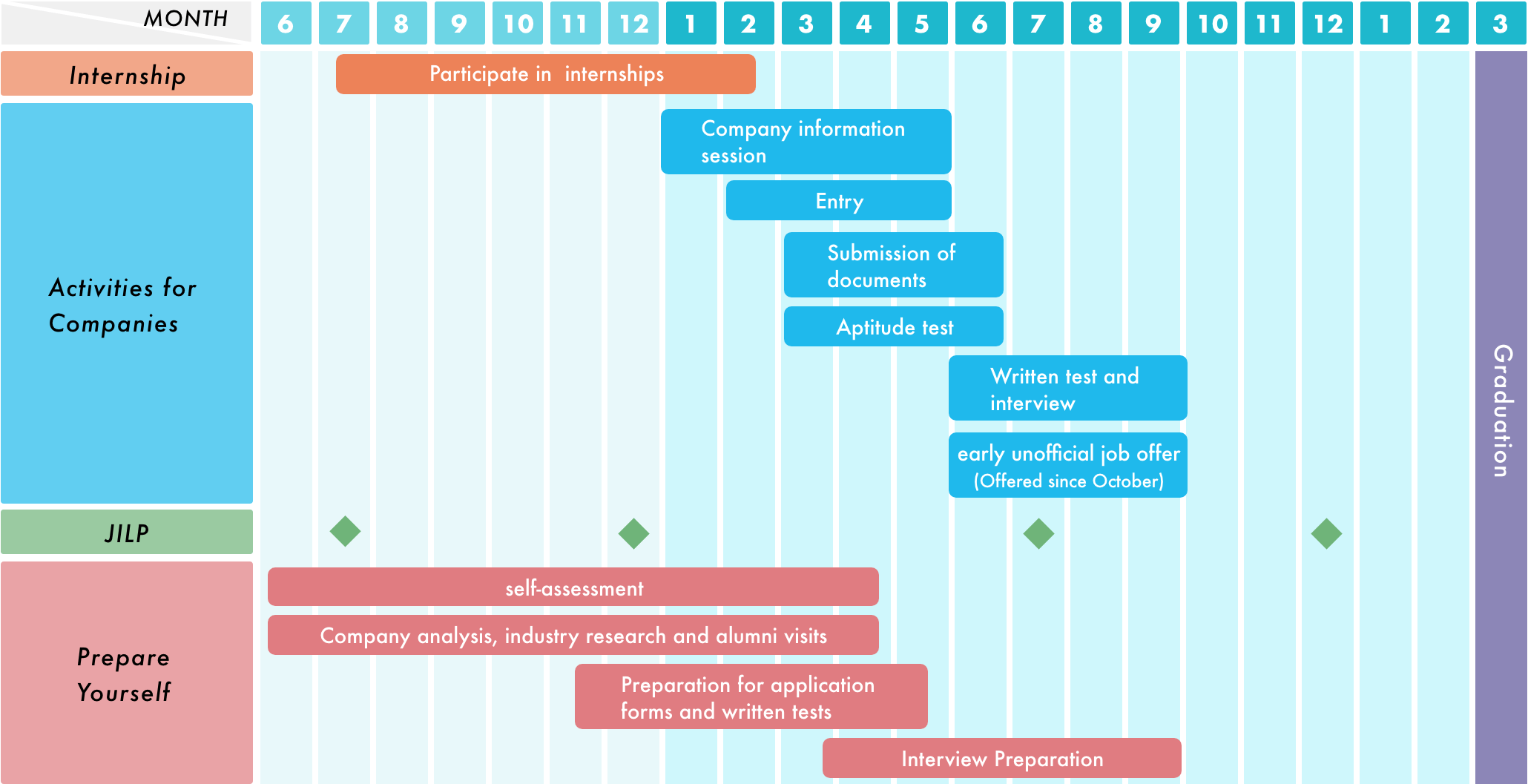
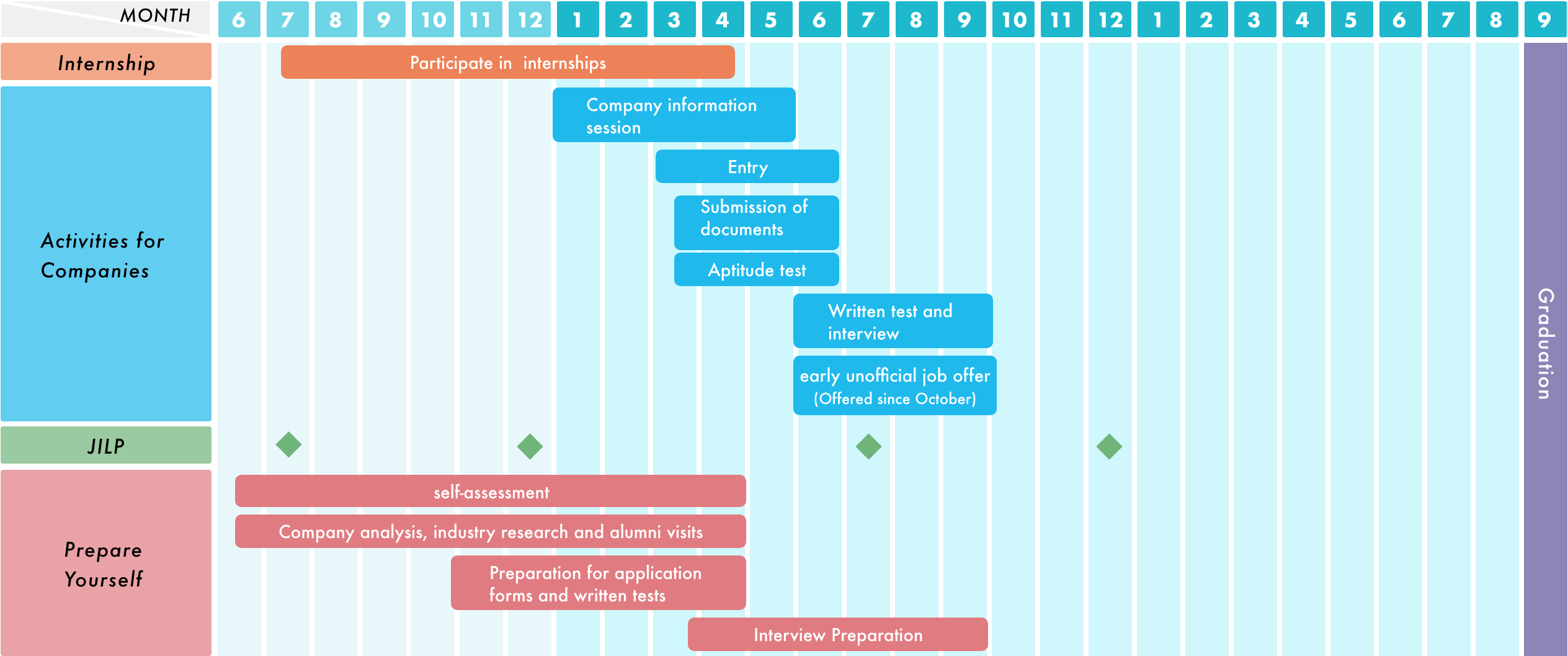
Employment Situation of International Students
According to a survey by the Japan Student Services Organization (JASSO), one out of three international students in undergraduate programs and one out of four in master's and doctoral degree programs find jobs in Japan.
-
Undergraduate Program 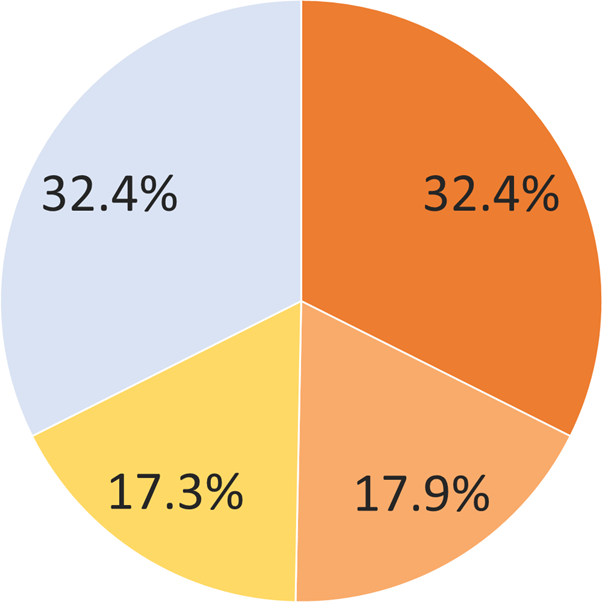
-
Master's Program 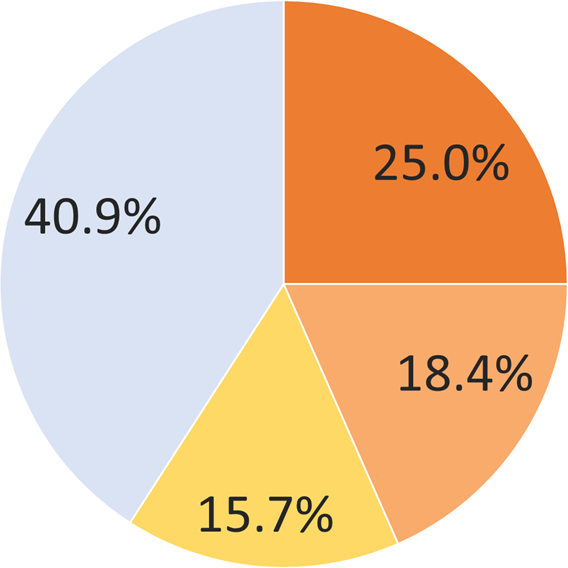
-
Doctoral Program 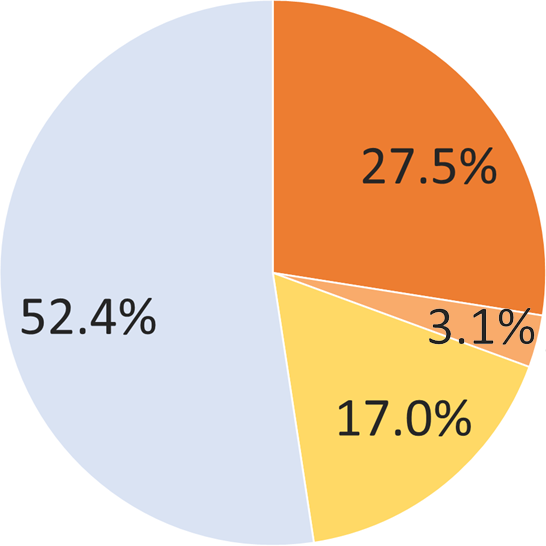
Of international students who graduated from (or completed) a Japanese higher education institution (e.g., graduate program or undergraduate program of university, junior college, institute of technology, vocational school, or preparatory education institution), those who found jobs in Japan were slightly less than 50% in AY2018/2019, and approx. 40% in AY2020.
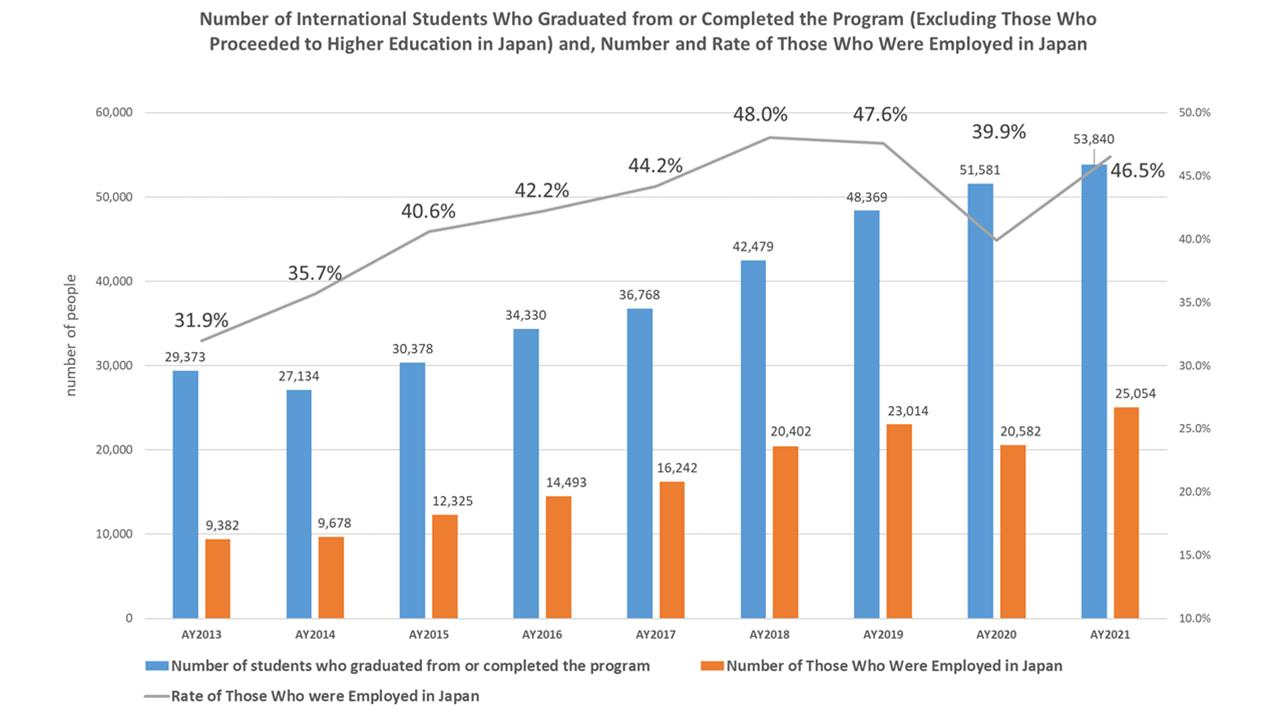
https://www.studyinjapan.go.jp/ja/statistics/shinro-and-gakui/
Employment Outcomes of International Students by Industries
| Manufacturing industry | |
|---|---|
| 1 | R&D/Engineering 44.7% |
| 2 | Administrator/Manager 23.7% |
| 3 | Manufacturing/Production/QC 21.1% |
| IT/Software 21.1% | |
| 4 | Architectural & Civil engineering 10.5% |
| 5 | International sales 7.9% |
| 6 | Domestic sales 5.3% |
| Non-Manufacturing industry | |
|---|---|
| 1 | IT/Software 50.0% |
| 2 | Administrator/Manager 26.5% |
| 3 | Domestic sales 17.6% |
| 4 | Trading/Distribution 8.8% |
| Planning/Marketing 8.8% | |
| Spesialist 8.8% | |
| 7 | International sales 5.9% |
| Manufacturing/Production/QC 5.9% | |
https://www.disc.co.jp/press_release/9495/
Alumni Success Stories
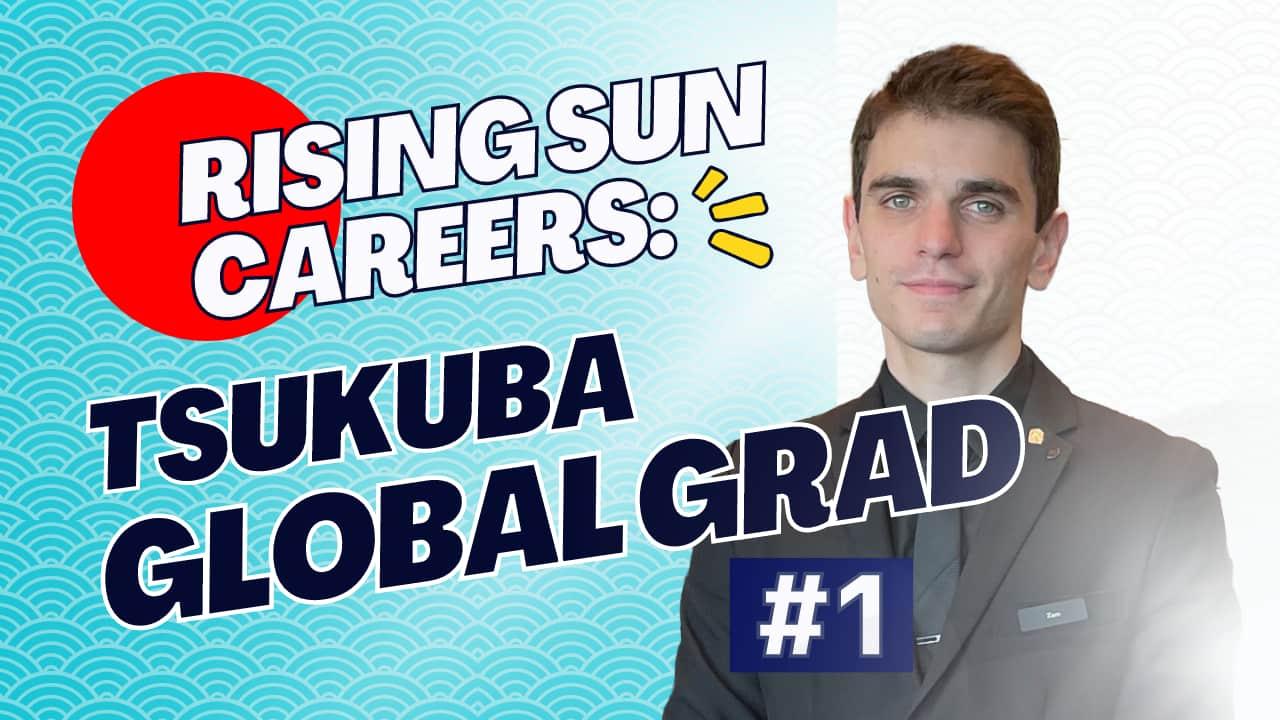
What made you decide to study in Japan?
I always wanted to go outside of my comfort zone and experience new things. And when I was made aware that there was a scholarship opportunity for studying in Japan, I was very interested in it since it was a great chance to study abroad, not just visiting a country for a couple of days, but actually finding out what a different culture is like and live there.So I think that's what made me interested in it.
What made you decide to study at University of Tsukuba?
Well, I'd always been interested in linguistics. When I was researching what universities I could potentially go to, I noticed that at the University of Tsukuba, Professor Ikeda Jun specializes in Semitic languages, Hebrew and Acadian. I never knew someone who specialized in those languages before. Usually, linguistics is very centered around European languages such as English, German, Spanish and Italian. But there aren't many researchers who are interested in other, more niche languages.
So, when I saw that he was doing that type of research I was interested because I wanted to see if there was something more about linguistics and I wanted to see what linguistics was like when it came to other languages, as well.
How was the life in Tsukuba city?
It was nice. It was very different from Tokyo where I had lived one year. The scholarship program I was in basically had me study for one year in the Tokyo University of Foreign Studies. After graduating from that program, based on my grades I was able to enter into the University of Tsukuba.
When I moved to Tsukuba, it was very different because there was a lot more space and the whole city was more open. There were fewer people and the campus was quite big compared to that of Tokyo University of Foreign Studies. So I enjoyed it quite a lot. I could go to Mount Tsukuba and I could take long walks. And the weather was really nice because it wasn't that hot during the summer in comparison with Tokyo.
I was able to make friends. During the first two years I lived in two different dormitories, Ichinoya and Hirasuna. After that I moved to an apartment, where I lived until I graduated. The dorms were quite small, but there were a lot of other students close by, so it was a fun experience.
And then, when I lived by myself I managed to make other friends, as well. So even though there isn't that much to do in school by yourself, if you have friends you can definitely have fun and enjoy your time.
What made you decide to stay and work in Japan?
I think I decided to stay in Japan maybe when I was a second-year student in Tsukuba.
I decided to do so because I enjoyed the society of Japan. I liked how people are generally pleasant and how they respect each other. And I thought that it was definitely a place where I wanted to stay for longer and wanted to explore more of. I wanted to learn more and travel more. So I am quite happy with where I am and I definitely want to continue living here.
How was the job hunting? Was it hard for you?
I think it's hard because if you don't graduate with a degree that is very specialized and technical, your options would be limited.
So, if you're a foreigner who has graduated with a degree in the humanities, it might be a little bit difficult. But if you've entered a university with physics or programming, finding a job would be much easier, I think.
Therefore, for me, it was slightly harder but at the same time it's not like there weren't any offers or anything like that.
What made you decide to work as a hotel receptionist?
As I said, because I studied linguistics I was interested in language and communication. So working at a hotel would allow me to practice that in reality and talk to people from various places all around the world.
On the one hand I wanted to improve myself, like my linguistic skills and my communication skills. But on the other hand, I thought that working at a hotel would give me room for growth. Working in a hotel I think is an option that has a longer career path.
What makes you feel satisfied about your job?
I think it's when I see how satisfied customers are when providing good service.
When they ask something, when they're lost and when they don't know what to do, then I am able to assist them. I think that's something that I really enjoy doing.
What is the hardest part in your job?
I'd say it's being able to work in a big team.
Because you can't do everything by yourself, you have to rely on other people, but everyone is different and they do things their own way. So, you need to be able to fit into a larger system. Sometimes it's not easy to do so.
How is the life in Tokyo?
Oh yes, it is different from Tsukuba.
On the one hand because I'm back in Tokyo I think I have more options for things to do. If I want, on my day off I can go anywhere I want in Tokyo because there are so many places to visit and so many museums and attractive places to go to. So that's one thing.
But on the other hand, there's not that much nature so there aren't many places you can go to and just relax. There aren't that many large parks and whatnot to go to, which is different from Tsukuba.
That's something I think I miss but there are so many people in Tokyo to meet, so I enjoy meeting new people and making friends. I definitely think that that's also a plus and I generally like it here.
What do you like the most in Japanese culture?
I think what I like the most is that people understand that in order to make a functioning society you have to be respectful of other people and not to be too selfish.
And the result of that is that everyone can live in a pretty content manner without any interruption from the outside.
Whereas in other countries I think people are quite self-centered, not in a bad way necessarily, but still, personal freedom is something that's very highly valued and that can lead to trouble because everyone wants to do things their way and then that leads to conflict.
Whereas in Japan, I feel that people are generally more concerned about how other people are dealing with things, and whether or not the actions of one person are detrimental to someone else.
It is interesting that the hardest part in work and the culture you like is quite similar. Could you give an advice to the readers how to live in a different culture?
I think that the most important aspect of living in an environment which is culturally different from one's own is to constantly remind yourself of that. If you avoid making the error of misunderstanding that you share the same cultural values with everyone else around, it is easier to notice the differences. From there, it's a question of understanding these differences, and I don't think that there is a better way of doing so than talking to people. These conversations can be extremely interesting and are, incidentally, a great way of making friends abroad.
-
Nov. 07, 2023It's to make the reverse pathwayEduardo Rezende GraminhoAjinomoto Co., Inc./Kyusyu Plant Bio-Speciality Group Production DepartmentDoctoral Program in Integrative Environmental Sciences, Graduate School of Life and Environmental SciencesFederative Republic of Brazil
-
Sep. 11, 2023Something I have created is really connected to my daily lifeFang ZhouLY Corporation(Former Yahoo! Japan Corporation)/Commerce Company, Shopping Services GroupMaster's Program in Informatics, Degree Programs in Comprehensive Human Sciences, Graduate School of Comprehensive Human SciencesPeople's Republic of China
-
Nov. 27, 2023The reason is that I have a special love for JapanNGUYEN QUOC HUNGHitachi,Ltd./Research & Development GroupDoctoral Program in Policy and Planning Sciences Degree Programs in Systems and Information Engineering Graduate School of Science and TechnologySocialist Republic of Viet Nam
-
Nov. 27, 2023I guess I just want to be a really good researcherPedro Baptista de CastroHitachi,Ltd./Research & Development GroupDoctoral Program in Engineering Sciences Subprogram in Materials Science and Engineering Degree Programs in Pure and Applied Sciences, Graduate School of Science and TechnologyFederative Republic of Brazil
-
Nov. 27, 2023Something that excites my mind is importantCésar Daniel Rojas FerrerHitachi,Ltd./Research & Development GroupPh.D. Program in Empowerment Informatics, School of Integrative and Global MajorsBolivarian Republic of Venezuela
-
Feb. 15, 2024I want to give back to the community that helped me when I came to studyJamie Azusa TaniSEKISHO CORPORATION/Corporate Planning Department, Corporate Planning SectionMaster's Program in Health and Sport Sciences, Graduate School of Comprehensive Human SciencesUnited States of America
-
Feb. 15, 2024I'm really interested in connecting Japan and UkraineKOLDAIEVA ALONASEKISHO CORPORATION/Mobility Planning And Development DepartmentMaster's Program in Humanities Subprogram in History and Anthropology, Degree Programs in Humanities and Social Sciences, Graduate School of Business Sciences, Humanities and Social SciencesUkraine
-
Jun. 28, 2024Any of your idea is possibleChen PengyuTama Art University/Full-time LecturerDoctoral Program in Art and Design Graduate School of Comprehensive Human SciencesTaiwan
-
Nov. 19, 2024I work only in Japanese because it's more challengingKAMILLA ENIKEEVAAccenture/Technology Consulting
Intelligent Software Engineering GroupMaster's Program in Heritage Studies, Degree Programs in Comprehensive Human Sciences, Graduate School of Comprehensive Human SciencesRepublic of Uzbekistan
What Led to Their Success?
-
Career Services
Through the guidance, individual career consultation and workshops, we support you in making concrete preparations for the future.
-
Japanese Language Education
At the Japanese Language Education Division of the Center for Education of Global Communication (CEGLOC), we hope to support the international students who are concentrating on their studies and communicate with the Japanese students and faculty.
-
Student Counseling
International student advisors, academic advisors are available to advise students on any problems.
-
Tutor System
Newly arrived international students can be assisted in their academic and daily life by Japanese students who are assigned as personal tutors.


